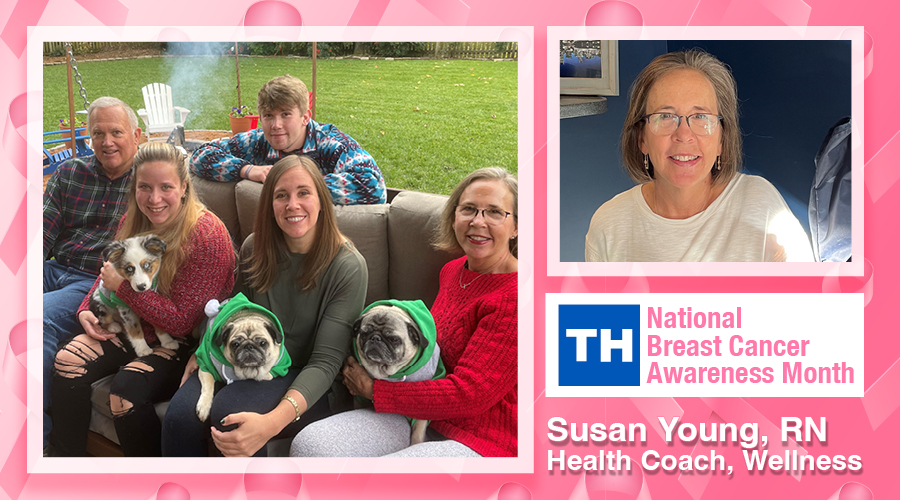By Susan Young, RN, Health Coach, Wellness
In November of 2015, I was diagnosed with breast cancer. In addition to the initial shock of the diagnosis, I was also overcome with feelings of denial, shame, fear, and powerlessness that others with cancer have also experienced. As someone who prioritized my own health and self-care for so many years, I couldn’t believe that I had cancer. How could it happen to me? These feelings made me want to isolate myself, but I knew that in order to fight through this, I would need help. Thankfully, I connected with a few people that had experienced a similar diagnosis who helped me get started. Although I’ll never be able to change the outcome of someone’s cancer diagnosis, my hope for sharing this is that I can make processing the diagnosis a bit easier so the focus turns to the road to recovery.
Dealing with a cancer diagnosis can bring a myriad of different concerns and feelings. You may feel anxious about how your treatment will interfere with doing the things you enjoy, your job, and your family dynamics. You may feel isolated from friends, living a unique experience from others. It also may be difficult to know how to make decisions about your care and where to get help.
Finding Ways to Heal, Cope, and Advocate for Yourself
The good news is there are experts who can help you deal with these concerns and a network of cancer survivors who can give you support. Reach out to your cancer care team, friends and family, spiritual advisors, your local cancer treatment centers, and national cancer support groups to help you find the resources and support you need. The most important thing is that you find the best way for you to heal, cope, and make the decisions you feel most comfortable with. There is no one-size-fits-all path to recovery.
In order to make good decisions, you have to be well-informed. Communicate well with your cancer care team to get answers and alleviate anxiety. Practice self-efficacy and fully participate in the decisions about your cancer treatment. In addition to your care team, communicate frequently with family and friends about how your feelings and concerns, rather than isolating yourself. It is important to be aware of your emotions and have them validated. Friends and family can also be extremely helpful to work out solutions to practical concerns and needs you may have.
Create a Network of Supporters
In addition to friends and family, I encourage you to seek the support of local and national breast cancer advocates and support groups who can help you prepare for financial changes, physical changes, and side effects that come with treatment. They can connect you with other breast cancer survivors who have experienced similar situations. They also have support groups for families, caregivers and children of people with breast cancer.
To promote normalcy during this time of change, stay in your routine as much as possible, but also consider seeking help through counseling if your feelings are keeping you from performing your normal daily activities. Counselors can help you deal with strong feelings, give you tools to cope with the changes cancer has brought into your life, and help you deal with symptoms of your cancer treatment.
A few other tips that helped me through my personal journey were seeking spiritual support and practicing self-care. My spiritual life and faith were very important to me during my cancer treatment because I could see my situation as a growth experience and could address hardships with my family more easily because I was at peace with it.
Adopt a Growth Mindset
Practice self-care to feel your best each day of your journey with breast cancer. Taking care of yourself involves being active, eating a nutritious diet, sleeping well, and reducing stress. Mindfulness and meditation can be especially helpful to maintain mental resilience during treatment. A common goal of mindfulness for patients and survivors is to adopt a growth mindset where your diagnosis does not define you. There are mindset tools that anyone can learn and put to practice developing a new mindset and lifestyle habits for managing through a cancer diagnosis.
When you are dealing with cancer, you face many goals and challenges. Some of these are medical and physical, some are emotional, and others are interpersonal and spiritual. In one way or another, they all have to do with the quality of your life, which has been threatened and disrupted by cancer. Ultimately, I encourage you to empower yourself to take control of what you are able to, and to learn how to best cope with what is out of your hands. Below are several resources to help you to do so.
Cancer Care and Counseling Resources
- TalkSpace Virtual Online Therapy
- American Cancer Society
- Susan G. Komen
- Reach To Recovery
- National Breast Cancer Foundation
- Young Survivor Coalition
- Breast Cancer.org Community Support
- Cancer Support Community
- Cancer Care
- Here For The Girls
Further reading
For more stories from our associates, clinicians and the communities we serve, please subscribe to our blog.
